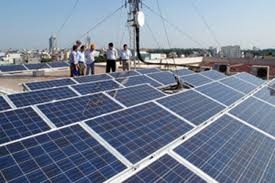 Economy
Economy

Over 100 provincial government officials, investors and other stakeholders gathered yesterday in HCM City to discuss policies for the developmnet of solar energy.
 |
| Solar energy has huge potential to develop in Việt Nam – baomoi.com |
HCM City – Over 100 provincial government officials, investors and other stakeholders gathered yesterday in HCM City to discuss policies for the developmnet of solar energy.
”We would like to provide guidance to investors, local governments and financial institutions about how to develop solar energy in Việt Nam,” Phạm Trọng Thực, deputy head of the Ministry of Industry and Trade’s Electricity and Renewable Energy Agency, said in his speech at a workshop on “Introduction of circular 16/2017/TT-BCT on solar power project development and standardized power purchase agreement for solar power projects”.
He explained the contents of the circular and took questions from participants.
Consultants from the Deutsche Gesellschaft für Internationale Zusammenarbeit (GIZ) shared the international perspective on solar power development in Việt Nam, and made a presentation on international and regional experiences in the technical and financial assessment of solar power projects.
Solar has been high on the agenda in Việt Nam since the publication of the Prime Minister’s decision 11/2017 in April, which fixed the price for solar power at 9.35 cents/kWh.
It also sets June 2019 as the deadline for solar power plants to be built and connected to the grid to receive the guaranteed solar feed-in tariff (FIT) price.
”In this context, the workshop is an opportunity for local governments to gain deeper understanding of the circular and insights into the latest solar developments, which will be helpful for better assessment and approval of solar power plants at provincial levels,” Sonia Lioret, head of the GIZ’s Renewable Energy and Energy Efficiency Project, said
Solar projects require high upfront investments. In some provinces, land availability or grid capacity limit the number of projects that can be approved by local and central authorities.
“It is therefore important to carefully assess the general viability of these new solar projects. This includes in particular the choice of site, experience of all parties and contract partners involved in the project and the quality of equipment and installation to avoid project failures or economic underperformance,” Lioret added.
“As solar power is still quite new in Việt Nam, and having in mind that all projects have to be built and connected by June 2019, we believe that the combination of local knowledge and international experience will be a great recipe for successful solar power projects”, Rainer Brohm, a German solar energy expert said.
According to the Vietnamese Government’s targets, solar power is expected to become the main new renewable energy source in the future, with an installed capacity to be increased from around 6-7 MW by the end of 2017 to 850 MW by 2020 (equivalent to 1.6 per cent of the country’s power generation) and 12,000 MW by 2030 (equivalent to 3.3 per cent of the country’s power generation). – VNS




